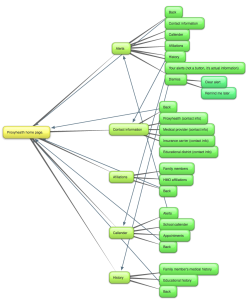 (image by Merelymel13 via Creative Commons)
(image by Merelymel13 via Creative Commons)
From all of us at here at the OpenLab, happy Fall! Keep looking out for those snakes, but so far, so good.
_____________________
Featured Course: Interaction Design
Today we’re featuring Professor Amelia Marzec’s Interaction Design course. A simple, robust course, featuring plenty of examples of student work (including the snazzy flowchart above, by the cleverly named Noitatidem group, which includes Ian, Remy, Rosa). In addition, Professor Marzec has readings and videos posted to her page, and in general seems to be humming along very nicely. An exemplary course site, if you’re looking for one.
___________________
Featured Resource: Cultivating Change in the Academy
We were looking around for resources and came across Cultivating Change in the Academy: 50+ Stories from the Digital Frontlines at the University of Minnesota in 2012 an incredible ebook on a broad swath of issues facing digital education. It ranges from practical advice on specific classroom practices, to more theoretical attempts to diagnose and predict our future. It’s really quite something, and we’re happy to find it, and happier to share it here.
____________________
Featured Tutorial: CubePoints
(video uploaded by nickantibarney shared via creative commons)
CubePoints is a way of awarding points (or “dollars,” if you’re feeling materialistic), to users for participating in your site–users have a great deal of control over what sorts of activities are worth points, and how many each activity is worth. We see this plug-in as particularly useful for student clubs and other school projects which have fewer inherent incentives to participation than courses. If you connect points to real-world prizes, or even just honorary titles, you might find your users are more active.
Many faculty around the world have come to believe that this model speaks to their students, encourages participation and enthusiasm particularly on low-stakes writing and other class work, and gets students thinking about school in different ways. You can learn more about an attempt to study a very similar idea here.
The plug-in itself is quite simple: it keeps track of each user’s activity, allows for a “leaderboard” on the site home-page, and gives the administrator a ton of specific options, making it very customizable. You can find out more about it the tutorial here.
And as always, contact us with any questions!




